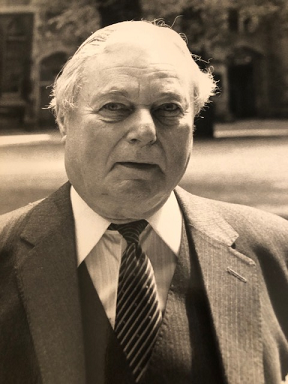Nuremberg landmark stirs a memory of Faculty great
26 Nov

Lionel Daiches, QC
THE 75th anniversary of the start of the Nuremberg Trials evoked a memory of one of the most charismatic figures in the Faculty’s history – Lionel Daiches, QC.
In 1991, Mr Daiches’ stable held a dinner to mark his 80th birthday, and it was chaired by Kevin Drummond, QC. As they sat together at the top table during a break, Mr Daiches joked that it felt like being on trial.
“He remarked that at least at Nuremberg there had been many more on trial. I was astonished, and said I didn’t know that he had played any part in the Nuremberg Trials. Lionel said he had been there in an observer capacity,” recalled Mr Drummond.
“People were taking their places and I didn’t have the chance to ask him any more. It was the last time I remember being in his company and, of course, I now regret not having pursued the conversation.
“I saw an item in Scottish Legal News about this month’s 75th anniversary of the Nuremberg Trials and it made me remember Lionel’s comment and the fact that I had sat alongside someone who had been there.”
Mr Daiches was admitted to the Faculty in 1946 and took Silk ten years later. He died in 1999, aged 88. He was described in one obituary as “a man of learning, style and substance and there is not the remotest chance that the Scottish Bar will ever see his likes again.”
His son, Michael Daiches, a barrister, says he has no specific recollection of Mr Daiches telling him about Nuremberg, although he sometimes spoke of his experiences in the Army in Italy during World War II. He was a prosecutor at courts martial.
“It is quite possible that he did attend (Nuremberg) because he met a number of influential lawyers while serving in the Army during the War, some of whom, such as Lord Russell of Liverpool and Lord Elwyn-Jones, were involved in the war crimes trials,” he added.
In 1960, Mr Daiches attended the trial of Captain Francis Gary Powers, a US pilot whose plane was shot down over the Soviet Union and who was accused of espionage at the Supreme Court of the USSR in Moscow.
According to AJR, the newspaper of the Association of Jewish Refugees in Great Britain, Mr Daiches “went as an observer, with a deep interest in the procedure and method of a Russian criminal trial.” It added: “Permission was granted as a result of personal intervention by Mr Khruschev.”
Two years earlier, Mr Daiches had visited the USSR and interviewed a number of lawyers and wrote a book, Russians at Law, a copy of which is held by the Advocates Library.